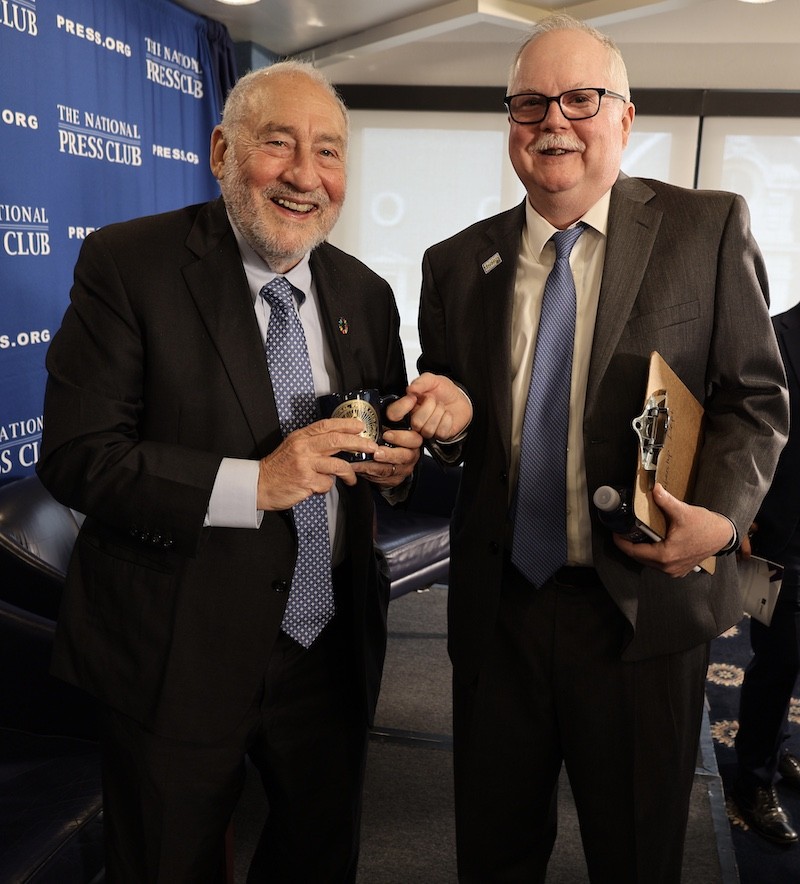Social media companies steal news outlets' intellectual property, Nobel laureate Stiglitz says
News organizations deserve payment for their valuable work as social media companies are enriching themselves by stealing their the intellectual property (IP), according to a Nobel Prize-winning economist.
“There's no free lunch,” Joseph Stiglitz said on April 17 during a National Press Club Headliners Coffee and Conversation event. “You don't get quality journalism, you don't do investigations, for free.”

Stiglitz, along with Arturo Herrera Gutierrez, global director for Governance Global Practice in the Equitable Growth, Finance, and Institutions Practice Group (EFI) Vice Presidency, Governance at the World Bank, and Kristjan Burgess, a senior programme specialist at UNESCO in Paris and a leader in its work on outreach and advocacy for freedom of expression and the safety of journalists, discussed a new study on the role of journalism in promoting democracy, political accountability and sustainable development.
Stiglitz said the accidental, but traditional, newspaper business model—advertisements and subscriptions—worked for over 100 years but has collapsed over the last 10 years due to social media. Social media companies, he said, caused advertisers to believe that it was a preferred method for advertising because it can use algorithms to target consumers. As the traditional method of advertising collapsed, so did paying for a news product, Stiglitz said.
The report, Journalism for Development, published by UNESCO with the support of the UNESCO Multi-Donor Programme on Freedom of Expression and Safety of Journalists, found that many social media companies have taken advantage of news stories provided by traditional media, often through violations of copyright laws that are difficult to detect and enforce.
Social media companies, Stiglitz said, are making billions, if not trillions of dollars in capital value by stealing the IP of legacy media. He was asked if a common opinion by many news consumers that news should be free can be fixed -- whether that be by creating an attitude in the public that news is something of value that should be paid for or whether that should be done through the government.
Stiglitz said his report calls for ways of recapturing that value by those news organizations who produce that valuable product. Lawmakers, he said, should write laws that allow for the capture of the value being created by legacy media.
“There's no doubt about the right answer,” he said. “It's yes, obviously. They're creating this enormous value. Those who are creating it ought to have the right to capture that.”
The report found accurate information provided to the public through professional journalism has a demonstrated positive influence on democracy, civic engagement and government accountability.
The report said public investment in journalism enhances societal trust and has important effects on the protection and promotion of human rights as well as sustainable development. Nonetheless, said the report, quality journalism is a public good and is therefore subject to classical free rider problems, so it is unlikely to be sufficiently provided in the absence of support from governments and donors.
The report created three “pillars” of recommendations for creating a robust and healthy environment for journalism envisioned by the 1993 Windhoek Declaration. This states that a free press is fundamental to democracy and a human right.
The first pillar is that journalists need to have access to information, or the right to know, enshrined in laws that are actually enforced.
The second pillar is that governments need to continue supporting journalism, whether by creating special funds or other initiatives such as providing funds for digitization, tax breaks, payroll credits, or subscription vouchers.
In the third pillar, governments need to counter the declining viability of private media. They can do this by developing legal frameworks through which legacy media outlets can recapture some of the revenues lost to social media. Competition laws and media ownership laws need to be updated for the digital age. Lastly, government financial support can be used to ensure plurality of views and the diversity of news sources.
